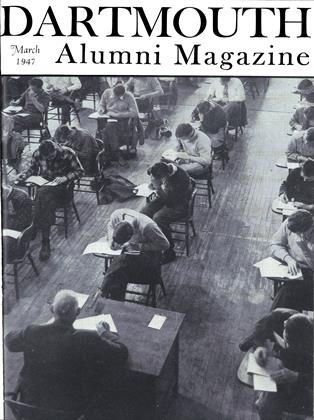By Walter Johnson'57. Henry Holt & Co., 1947, pp. 468, $3.75.
Among the several verbal portraits of the Emporia editor, now or soon to be available, this selection from his letters is destined to rank high. It includes a decidedly important period from which the autobiography stops short. It gives his impressions as they were currently forming rather than a summary of everything as it appeared from the end, with such glossing over of misjudgments and frustrations as then prove inevitable. I like to know a man from his letters. And there have been few more interesting correspondents than William Allen White. He kept two stenographers busy and often three. He felt none of that restraint about putting things on paper which modern business practices, under shrewd legal advisers, customarily enjoin.
White would write an editorial, mail it to the man chiefly concerned—as to Gordell Hull, Democrat, in support of his tariff bargaining plan—and then offer to supply copies to whomever Hull might suggest. This opened a correspondence and usually an intimacy. White espoused nearly all the progressive causes of his era of which the normal Republican fought shy. F.D.R. truthfully said that White supported him 364 days in every year. With the exception of the brief Bull Moose period—hardly an exception—he was always a Republican on election day.
White's breezy estimates of men—of Munsey, Harding, Bricker, Hoover, Wilson, etc., often prove unforgettable. In spite of his "wisecracks on such occasions, he was invariably friendly and usually helpful in his correspondence in his life. Not since the great Samuel Bowles of Springfield has any editor in a small field exhibited so many forms of public leadership. White was often a poor prophet. He misjudged tendencies, as in his expectation that Willkie before the Wisconsin primaries—would be again the Republican leader, and in his early withdrawal from the movement for the Defense of America by Aiding the Allies. But he was an intriguing figure. His letters reveal him faithfully.
 View Full Issue
View Full Issue
More From This Issue
-
 Article
Article"Free as the Air"
March 1947 By JERRY A. DANZIG '34, -
 Class Notes
Class Notes1918
March 1947 By ERNEST H. EARLEY, DONALD L. BARR -
 Article
ArticleRadio Interprets the News
March 1947 By CEDRIC FOSTER '24, -
 Class Notes
Class Notes1937
March 1947 By JOHN H. DEVLIN, ARTHUR H. RUGGLES JR. -
 Article
ArticlePHYSICS FOR THE FUTURE
March 1947 By PROF. ARTHUR B. MESERVEY '06. -
 Class Notes
Class Notes1921
March 1947 By DONALD G. MIX, ROBERT M. MACDONALD
Robert Lincoln O'Brien '91
Books
-
 Books
BooksALUMNI PUBLICATIONS
June 1917 -
 Books
BooksTHE DISCOVERY OF THE ANCIENT WORLD
November 1932 By John Barker Stearns -
 Books
BooksContradiction
March 1981 By John S. Major -
 Books
BooksI SPEAK FOR JOE DOAKES
May 1945 By Louis O. Foster -
 Books
BooksSCRAMBLED EGGS SUPER.
May 1953 By Maude D. French -
 Books
BooksCOMMUNICABLE DISEASE CONTROL,
March 1942 By Rolf C. Syvertsen, M.D. '18



